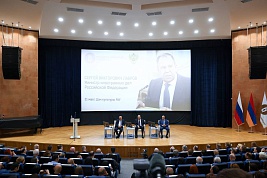Russian MFA Spokesman Andrei Nesterenko Interview with RIA Novosti on the Upcoming Attendance of Russian Minister of Foreign Affairs Sergey Lavrov at the Seventh OSCE Annual Security Review Conference
Question: The Seventh OSCE Annual Security Review Conference (ASRC) will take place in Vienna, which Foreign Minister Sergey Lavrov will attend. What is the format of the upcoming event?
Answer: The Seventh OSCE Annual Security Review Conference will be held in Vienna from June 23-24. Sergey Lavrov will speak at its opening as a guest of honor at the invitation of Dora Bakoyannis, OSCE Chairperson-in-Office and Minister for Foreign Affairs of Greece.
ASRC is the chief review event of the OSCE, during which its participating states examine problems and commitments in the realm of "hard security," including arms control and confidence building issues, counteraction against new threats and challenges and conflict settlement. Proposals and recommendations voiced by ASRC participants may form the basis of possible draft decisions of the Permanent Council and Council of Ministers of the OSCE.
We look forward to continued discussion during the ASRC of Russian President Dmitry Medvedev's initiative for a legally binding European Security Treaty (EST). The dialogue in the OSCE framework had begun at the Helsinki Ministerial Council (December 4-5, 2008) and continued during the joint meeting of the Forum for Security Cooperation and the Permanent Council (February 18, 2009) and the winter session of the Parliamentary Assembly (February 19-20, 2009).
On the fringes of ASRC, Sergey Lavrov is scheduled to meet with senior OSCE officials and with heads of national delegations.
Question: What are Russia's approaches to the issues of ensuring security in the Euro-Atlantic region?
Answer: The Russian side is not pleased with the situation of hard security in the Euro-Atlantic region. This shows itself in the deep crisis of the Adapted CFE Treaty, in stagnant confidence-building efforts, in attempts at settling regional conflicts by force, which stood out vividly on the part of Georgia in August 2008, and in the lingering threats of international terrorism, drug trafficking and other forms of transfrontier organized crime. This state of affairs is due to the fact that the basic principles of relations have ceased to work in the Euro-Atlantic area, first of all the commitment to not secure oneself at others' expense and the principle of the nonuse of military force in conflict settlement.
President Medvedev's initiative to craft an EST is aimed at rectifying this alarming situation. The Russian side wants hard security issues to become the subject matter of an EST, its range of parties to include both states and major international organizations active in the sphere of security in the Euro-Atlantic space, and the EST provisions to be legally binding upon all its parties. We consider that the elaboration of an EST should be conducted on an independent negotiation platform not tied to the OSCE.
Question: Is the Russian delegation planning to submit any additional proposals in the framework of the OSCE discussion of security problems?
Answer: During the ASRC, the Russian delegation intends to present some concrete recommendations for further steps in the OSCE security agenda framework. It is borne in mind to suggest inventorying member states' commitments in the security dimension; to intensify efforts for restoring the viability of the CFE regime; to embark on the modernization of the Vienna Document 1999 of the Negotiations on Confidence- and Security-Building Measures; to start a dialogue on uniform principles for the peaceful settlement of conflicts; and to hold a meeting of leaders of five international organizations – OSCE, CSTO, NATO, EU and CIS – in 2010 to compare their security strategies with a view to creating an indivisible security space in the Euro-Atlantic region.
The Russian side expects ASRC-2009 to give additional impulse to dialogue among states and international organizations on Euro-Atlantic security issues and to the work in the OSCE framework on the reinvigoration of the military-political dimension of this Organization.
June 19, 2009
